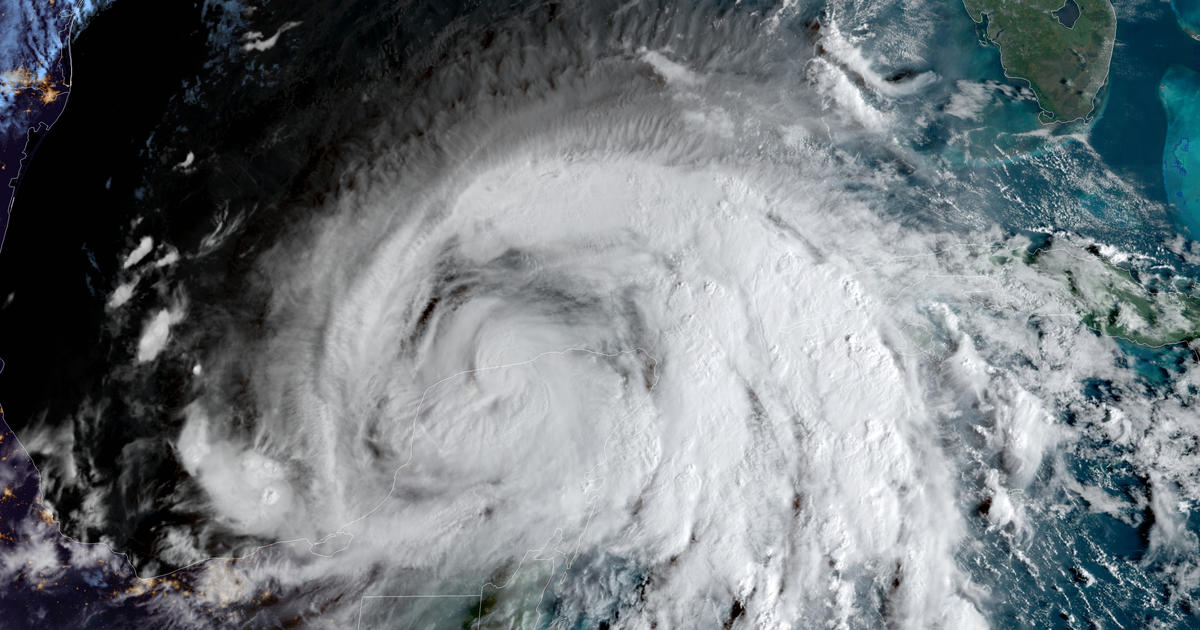Storm-weary Louisiana is once again under a hurricane warning, with Zeta leaving Mexico’s Yucatan Peninsula on a path that could hit New Orleans Wednesday night. Zeta, the 27th named storm in a very busy Atlantic season, made landfall as a hurricane just north of the ancient Mayan city of Tulum with maximum sustained winds of 80 mph.
It weakened to a tropical storm as it crossed over land, but it was expected to regain its strength over the Gulf of Mexico.
Zeta’s top winds were 70 mph early Tuesday, centered about 540 miles south of the mouth of the Mississippi River. A hurricane warning was in effect for New Orleans, the nearby lakes Pontchartrain and Maurepas and from Morgan City, Louisiana, to the Mississippi-Alabama state line.
If Zeta makes landfall in Louisiana, it will be the fifth named storm to hit the state this year, joining Cristobal, Laura, Marco and Delta.
Tropical Storm Zeta moves over Mexico’s Yucatan Peninsula in a satellite image captured at 8:56 a.m. ET on October 27, 2020.
NOAA
Zeta was still drenching the northern Yucatan as its center moved over the water. Quintana Roo state Governor Carlos Joaquín said via Twitter early Tuesday that early reports indicated his state suffered no major damage, nor were there reports of deaths or injuries. He said airports were open and business activity could resume Tuesday morning, though beaches would remain closed until the surf calms.
In Playa del Carmen, between Tulum and Cancun, a Twitter user posted a video showing the area being hit by rain and wind.
Mexican tourist Elsa Márquez held up her beach towel Monday so it flapped in the wind, rattling with the strong gusts a few hours before Zeta’s arrival.
“This is our first experience (in a hurricane) and the truth is we are a little afraid because we don’t know what will happen, but here we are,” said Márquez, who was visiting the resort from the north-central state of Queretaro.
Another tourist, Mario Ortiz Rosas from the western state of Michoacan, looked at the rising waves, noting: “I didn’t plan for this, but it looks like it is going to get complicated.”
Some boats that normally carry tourists in Cancun took refuge in a nearby lagoon channel, anchored among the mangroves to avoid the battering wind, waves and storm surge. Boat captain Francisco Sosa Rosado noted they had to perform the same maneuver barely three weeks ago, when the area was hit by a stronger Hurricane Delta, which made landfall with top winds of 110 mph.
“With Delta, the gusts of wind were very strong … the anchor lines were at risk of breaking,” Sosa Rosado said. “I hope it won’t be as bad with this hurricane.”
Trees felled by Delta littered parts of Cancun, stacked along roadsides and in parks, and there was concern they could become projectiles when Zeta blew through. A number of stoplights around the vacation destination remained unrepaired since Delta.
Quintana Roo state officials reported nearly 60,000 tourists in the state as of midweek. They said 71 shelters were readied for tourists or residents who might need them, though the governor said he hoped it would not be necessary to move guests out of their hotels.
Zeta broke the record for the previous earliest 27th Atlantic named storm that formed November 29, 2005. It’s also the 11th hurricane of the season. An average season sees six hurricanes and 12 named storms.
There have been so many storms this season that the hurricane center had to turn to the Greek alphabet after running out of assigned names.
Zeta is the furthest into the Greek alphabet the Atlantic season has gone. There was also a Tropical Storm Zeta in 2005, but that year had 28 storms because meteorologists later went back and found they missed one, which then became an “unnamed named storm.”
